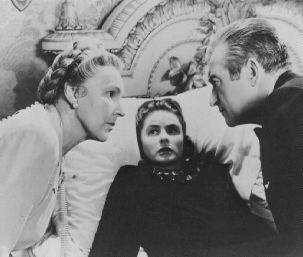The
Mother of All Hitchcock Cinema:Was Whistler's portrait of his own mother the inspiration for the rocking chair mother of Psycho?
One of the most powerful recurring themes in Hitchcock's films is the procession of domineering Mothers: the jealously possessive Madame Sebastian in Notorious, the evil mother figure Miss Danvers in Rebecca, the strange attachment of Cary Grant to his character's mother, Mrs. Thornhill, played by Jesse Royce Landis, an actress his own age.
 And of course, there was that lasting influence of Mrs. Bates on her son Norman. Did Hitchcock's mother Emma leave a similar lasting influence on her own son?
And of course, there was that lasting influence of Mrs. Bates on her son Norman. Did Hitchcock's mother Emma leave a similar lasting influence on her own son?
Hitch&Alma points out some of the recurring possessive mothers in Hitchcock's films and speculatively links these references to Hitchcock's London childhood his relation with his own mother, Emma. It should be stressed that all segments of the story involving Hitchcock's childhood and the Mother character are purely invention on the author's part.
In reality, Hitchcock was nothing but the devoted son, often taking his mother Emma along on vacations with Alma. Hitchcock's father died when he was still a young boy, and a deeper attachment between mother and her youngest son naturally resulted.
Young Alfred's precocious interest in sex within the story is also probably grossly inaccurate. Commenting on the Victorian prudery that characterized his youth, Hitchcock later recounted to writer David Freeman that in his day there was hardly any mention of sex up until the first matrimonial night, if even then.
The story's characterization of Hitchcock's mother was completely drawn from the body of Hitchcock's own films. The possessive, jealous matriarch who constantly recurs throughout Hitchcock's films, would seem to be a cry of some suppressed resentment against his own mother.
In Emma Hitchcock's defense, I offer two portraits from his films that Hitchcock surely intended as sympathetic portrayals of his mother. Emma Newton, the mother and sister of the two Charlies in Shadow of a Doubt, is the archetypical self-denying gentle matriarch, around whose strength the entire family depends upon.
Emma's stark decency stands at the opposite pole to her "Merry Widow" murdering brother Charles Oakley, who's wizened cynicism reflects much of Hitchcock's own sensibility. There's a delightful scene in the beginning of the film when Emma, speaking over the phone, explains that the youngest child in any family is always spoiled. As she says this, the boy playing her youngest son lets out an exasperated sigh as he rolls his eyes upward, clearly reflecting Hitchcock's own views on the matter.
After the hyperbole of the all consuming Norma Bates in Psycho, Hitchcock's next film, The Birds, portrayed Mitch's mother in a far more favorable light. Lydia Brenner is seen as a sympathetic and vulnerable widow, "not so much afraid of being abandoned by her son, but afraid that her son would find love with another woman that she herself could not give him."
Mitch's love interest, Melanie Daniels, a worldly woman abandoned by her own mother, envies the closeness Mitch shares with his mother and goes out of her way to embrace Lydia. Perhaps this is Hitchcock's mea culpa for his many harsher portrayals of motherhood, and is a probable reflection of the harmony and accord that characterized the real life relation between Emma and Alma Hitchcock.
![]() A reading sample from Hitch&Alma:
A reading sample from Hitch&Alma:
![]() An interview with author of Hitch&Alma, Robert Schoen
An interview with author of Hitch&Alma, Robert Schoen
![]() Did Hitch have a secret collection of Outtakes? Some Photos and Posters:
Did Hitch have a secret collection of Outtakes? Some Photos and Posters:
![]() Alma, the woman behind a very large man:
Alma, the woman behind a very large man:
![]() Hitchcock's Other Leading Ladies:
Hitchcock's Other Leading Ladies:
![]() Events during the Hitchcock Centennial:
Events during the Hitchcock Centennial:
![]() Hitch & Herrmann, artists with the same obsessive vision:
Hitch & Herrmann, artists with the same obsessive vision:
![]() Readerís and Web Site Visitorís Comments:
Readerís and Web Site Visitorís Comments:
![]() Book description and how to order a copy of Hitch&Alma:
Book description and how to order a copy of Hitch&Alma:
![]() Links to other Great Hitchcock Web Sites:
Links to other Great Hitchcock Web Sites:
![]()